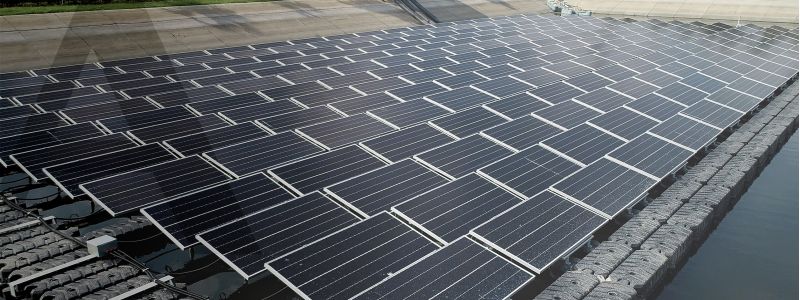Energy Management
Energy Management
Risk
As a result of the global emphasis on social and environmental responsibility in the industrial sector, which includes the reduction of greenhouse gas emissions resulting from different forms of energy use, the Company consumes a considerable amount of electricity to manage all of its industrial estates. Additionally, major companies, both domestic and international, that operate in the industrial estates are presently interested in and have a growing renewable energy consumption. Failure to meet the present and future demand of customers may have long-term consequences for the Company's competitiveness and revenue generation.
Opportunity
The Company sees an opportunity to develop products and services to meet the needs of current and future customers, such as the production and use of clean energy in industrial estates, promoting the use of electric vehicles, and selecting technologies that increase energy efficiency, etc. The Company also aims to become a carbon-neutral city by 2040 with the Smart Energy project, which is one of the projects under the AMATA Smart City initiative. This project focuses on renewable energy and the smart grid to use energy efficiently, and enhance power system stability. The use of clean energy will preserve the environment, reduce pollution from fossil fuel power plants, and lower greenhouse gas emissions. These opportunities will help mitigate the impact on the industrial sector, build confidence, and generate income and competitiveness for the Company.
Management Approach
The main energy-consuming activities in the Company’s operation are as follows:


The Company remains committed to continuing the process to ensure that its overall use of energy, both from electricity and fuel, is efficient. Approaches to reduce the use of energy are as follows:

Energy Saving in Office Building
The Company has organized the activities continuously to promote the Company’s employees and the tenants in the office building to obtain more knowledge about the energy consumption reduction in the building by focusing on building every employee’s awareness to participate in energy conservation and the appropriate consumption of natural resources and environment to achieve sustainability; e.g. campaign to turn off air conditionings and unnecessary lights, campaign to use the stairs instead of elevators and adjustment of the temperature of air conditioning system in the offices not to be lower than 24 degrees Celsius, and turn-off of the screen of computer’s monitor every time when not in use, etc.
In 2022, the Company's office buildings had a total electricity consumption of 658,308.64 kWh, an increase of 39.7% from that in 2021, as a result of employees returning to work in the office and having more office activities after the COVID-19 pandemic.
Energy Saving in Common Areas
In terms of the common areas of the industrial estates, the Company is responsible for all road lighting systems within the estates. In 2022, the energy consumption in the common areas increased by 15% due to expansion in new phases, resulting in higher electricity usage. All the lighting used in the common areas of both industrial estates consisted of 100% LED bulbs. A Smart control system was installed in lighting control boxes to optimize the efficiency of the lighting system. 123 Solar Traffic Lights were installed in AMATA City Chonburi Industrial Estate and AMATA City Rayong Industrial Estate to reduce electricity consumption. In addition, three online Smart Weather Stations using solar power were installed at AMATA City Rayong Industrial Estate in 2022.
In 2022, the Company purchased 30.76 million kWh-electricity from non-renewable source, decreased by 8.4% from 2021 and 11.9% from the base year 2019.
Promotion of the Use of Renewable Energy in the Company's Public Utility System
The Company encourages subsidiaries in its supply chain to increase energy management efficiency and reduce electricity consumption, particularly in industrial water systems, which are the most energy-intensive activities. Amata Water Co., Ltd., which is responsible for water and wastewater management in AMATA Industrial Estates, has therefore conducted a study on how to use renewable energy from solar power to replace electricity in the operational process and has installed solar panels on the roof of the water reclamation system building since 2017. Furthermore, in 2019, AMATA Water Co., Ltd. started to develop a plan to install floating solar panels in its reservoirs. Currently, annual solar-generated electricity replacement consumption is 3,327,576 kilowatt-hours, which represents 25% of the total electricity consumption of the water supply system, wastewater treatment system, reclamation system, and raw water pumping system. As a result, greenhouse gas emissions were reduced by 1,663 tons of carbon dioxide equivalents per year.

In 2022, the Company consumed all types of energy within and outside the organization for main activities in its supply chain, totaling 194,107.11 gigajoules, a decrease of 5.5% compared to 2021, and the energy consumption intensity in 2022 was 6.02 gigajoules per rai, or 37.61 gigajoules per hectare, a decrease of 4.5% from the 2019 base year due to the considerable growth in solar energy production within the industrial estates in 2022 and various measures to reduce the use of purchased electricity.

Start
Building the Future
with AMATA

Start
Building the Future
with AMATA
Contact us for more details.
(+66) 38 939 007
(+84) 251 3991 007 (South)
(+84) 203 3567 007 (North)
(+95) 1 230 5627
(+856) 21 810007
(+856) 20 5710007 (Chinese)
(+856) 20 57550007 (English)
© AMATA CORPORATION PCL. All rights reserved. Web by Toneyes







